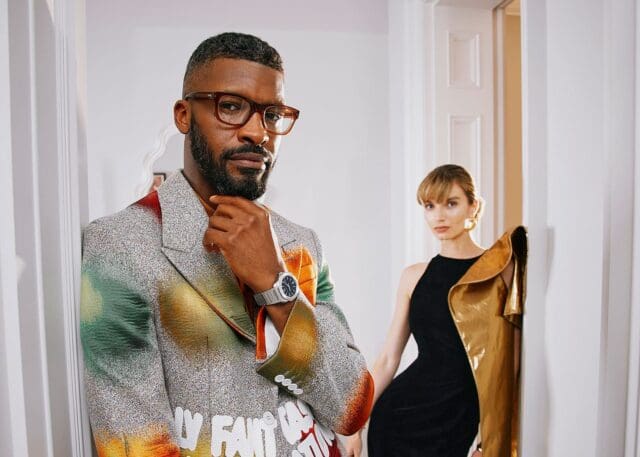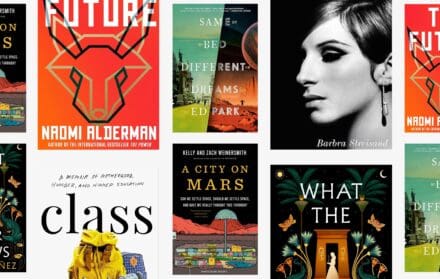
Hitting the high notes: CharlieSiem is the violin virtuoso making classical music cool
Following the release of his sixth album, Between the Clouds, Luxury London schedules a date with the violinist who counts Miley Cyrus and Katy Perry as fans.
Charlie Siem is the sort of man you want your daughter to bring home. A smartly turned-out (those double-breasted blazers are tailor-made by a military outfitter in Piccadilly), pedigree-educated (Eton and Cambridge, seeing as though you’re asking) man-about-town (London, Florence, the South of France, mainly) with matinée-idol good looks (he’s modelled for Armani, Chanel and Dunhill, your daughter will drop in over dinner), a Calvinist work ethic (‘Charlie landed his first gig when he was 15, Daddy, and has been working pretty much nonstop ever since’) and a few quid in the bank (Lizzy won’t mention the Norwegian oil-and-gas billionaire-tycoon father, but you are already connected those dots during your pre-dinner due-diligence Googling).
Sure, pads in the playboy Meccas of Monaco and Gstaad raise suspicions, but then the six-foot-plus professor (the UK’s youngest ever Professor of Music, now that you bring it up) mentions, in eloquent baritone RP, naturally, that he once performed onstage with The Who and all you can think about is VIP tickets and backstage access and who are you to turn down a week in Monte Carlo in early May anyway?
Charlie, it comes to light as the evening progresses, was a friend of the late Karl Lagerfeld (the name rings a bell). He modelled for the designer’s Dior campaign back in 2016, the same year in which he was photographed on the front row at Paris Fashion Week (arm-in-arm with Wendi Deng, Rupert Murdoch’s third wife, you’ll learn during your post-dinner due-diligence Googling).
‘Anyway, modelling is something Charlie does on the side, Daddy. Charlie plays the violin. He’s really rather good. “The James Bond of classical music”, didn’t someone once say? With The Royal and Moscow and Israel and Czech and Oslo Philharmonics. China, Australia, North and South America, you name it. He’s performed for the Queen of Denmark. And Lady Gaga.’
‘Yes, yes,’ you’ll hear yourself saying, leading Charlie through to the drawing room, ‘we’re huge admirers of your work, fantastic stuff, please, do take a seat, make yourself at home, there’s more Chablis in the fridge, or would you prefer red? Now, about this place in Monaco…’

Hello Charlie, lovely to meet you. You recently released your latest album, Between the Clouds, with your long-time pianist sonata partner, Itamar Golan. Tell us about the project.
Lovely to meet you too, and yes, the idea was a collection of fairly light and fun pieces that are really integral to the core canon of the violin repertoire – a kind of encore repertoire of accessible violin and piano pieces by the likes of Kreisler, Sarasate, Paganini, Elgar and Wieniawski that Itamar and I had played together in recitals. It’s not by any means a commercial album but it’s something that hasn’t been done all that much before.
Covid-19 has had you holed up in Florence. How has the pandemic affected you both professionally and personally?
I went to Oslo for a festival last summer but otherwise I’ve basically been pretty much out of it since March 2020, when I played in Lebanon. It’s been quite devastating from a career sense, and I’ve not been booked into the future because of all the uncertainty. The festivals that are booking aren’t until 2022. But the effect the pandemic has had on me as a human being in some ways has been quite positive. I would never have taken a sabbatical, I would never have taken a long break; I lived from concert to concert; in many ways I was dependent on being invited to come and play somewhere so that my life had structure and meaning and progress. And because that’s been stopped, I’ve had to re-evaluate, on a fundamental level, my own identity, in what it is I find meaning.
Has the lack of live music events forced you to consider different ways of connecting with fans?
Yes, I think this whole period has actually made it possible to connect with people on a more individual basis, on a more intimate level. I’m aware that I need to explore ways of doing so, which is why I’ve been developing a TV-type concept, being based in Italy, travelling from one city to another, exploring the cultural stories in each place, and then performing in each city. It’s a sort of documentary, or reality TV show, based on a group of orchestra players and how they interact and engage with the music they’re playing.
You should reach out to ITV2, perhaps they’ll commission it. Maybe not. Shame. What’s the biggest misconception about classical music?
I think people assume that it’s difficult to connect with. A lot of people assume it’s something that might be beyond them – that it’s for people who have a pre-existing education in classical music. People think it represents something elitist, which is a complete misconception. It’s true that, to a certain extent, one needs a little more patience, a bit more of an investment to connect to some aspects of classical music – but certainly not all. I think anyone can find meaning in classical music if they are willing to try.

Which pieces of music would you suggest offer a gateway for complete classical novices?
I think Bach is the foundation of so much of the classical canon; it’s not necessarily the easiest thing to listen to but if you can take the time, if you can get into a sort of meditative state to be able to listen to the solo Cello Suites, for instance, I think there’s something so spiritually relevant and easy to connect with. The Bach keyboard works and the Goldberg Variations, again, are something so pure and integral to the human experience. Mozart’s Requiem is something that people recognise that they can relate to from its references in cinema and pop cultural contexts. Bach’s St Matthew Passion is the same sort of thing. The Mozart symphonies, the Beethoven symphonies, the Brahms symphonies – you’re talking about the foundations of all subsequent music-making.
You perform with one of the rarest instruments on the classical stage – a 1735 Guarneri del Gesú violin previously owned by the King of Prussia and the great Yehudi Menuhin. Would you ever swap it in?
I’ve played with this violin for almost 15 years; everything I’ve done has been done with this violin. It’s not because I think it’s wonderful sounding or because it’s easy to play because actually it’s quite the opposite. It’s not the most reliable instrument. It’s very temperamental. I’ll arrive at a concert, pick it up and it just doesn’t want to play. At one point I was going to sell it, but, as I began the process, I realised that actually there was no way I could. I guess I’m pretty faithful. I’m a passenger in its life more than it’s a passenger in mine.
Judging by your Instagram account, it looks as though you’re nearly as into your clothes as you are your music?
Ha, not quite but I’ve always been fascinated by the little things, the small details, not just in clothes but the accessories of life, whether it’s a lighter or a glass. All these things extenuate your experience of life. Since I was a child, from watching movies and observing people, those who took more care on the details of their lives inspired me. Some people can sit on a plastic chair and wear a T-shirt and be fine. I realised that wasn’t the case for me. I need a bit of artistry to feel that I am getting the most out of life.

Who are your favourite tailors?
I’ve only ever had one and its very random how I ended up with him. When I was at school, my best friend’s father was a colonel in the Grenadier Guards and had all of his clothes made by Meyer & Mortimer, which is a military tailor that used to be on Sackville Street but is now on Piccadilly. My friend had a lot of hand-me-downs from his dad and he’d wear them to school. We always wondered who this Meyer & Mortimer was and so we went there when we were about 18 and we found this dusty old tailors. I decided I was going to get an overcoat made to see what this whole thing was all about. And I just never really went anywhere else.
Presumably they’ve snapped you up as an ambassador?
Ha! No, they’re not that progressive in that sense – although they certainly haven’t changed the price!
Watch guy?
Not really. I got a Cartier Tank when I was 21 which I wear not on a daily basis. I bought a Rolex Submariner after I played a few concerts when I was about 20, but I gave it as a gift to my sister years ago. I think they look better on women than men to be honest.
You chose to study Music at the University of Cambridge rather than enrol at a violin-focused conservatoire. Why was it important for you to have a broad understanding of music rather than concentrate solely on your technical training?
I didn’t grow up in a musical family and they weren’t necessarily that supportive of me and my obsession with playing the violin. Even by the age of 12 I was pretty convinced about pursuing a career as a solo violinist. I was pretty convinced of not going to school and just following that one-track path – surprisingly, my parents weren’t really sure about that. They managed to persuade me that staying in a broad-based education would be beneficial to me and by the time I was 18 I realised I didn’t want to go to a conservatoire. I thought being in a university environment, being on a campus and being able to engage with people who did all sorts of things would be inspiring on a human level. Even if I wasn’t going to get the kind of intense violin-focused study you get with a conservatoire.

Most memorable performances?
Playing with Zubin Mehta and the Israel Philharmonic Orchestra in China was incredible, partly because I’ve always been such a huge fan of Zubin Mehta. It’s always been a dream to play with the Israel Philharmonic, one of the iconic orchestras. Playing the Royal Albert Hall is always special as I grew up next to it.
Which venues are particularly spectacular to perform within?
I remember the Sala in São Paulo being a surprisingly great venue. It was in this pretty run-down part of town, and out of nowhere came this incredibly grand concert hall. We had to ride in bullet-proof cars to get there, but once inside it was a fantastically larger-than-life venue to play.
Tell us that travelling the world to do what you love isn’t as fabulous as it looks?
Well, over the past year, I’ve realised how much I can’t stand travelling. I was getting on a plane almost once a week and if you do it regularly enough you become numb to it, but I think travelling is very uncivilised now. The way you are greeted at airports, the queues, it’s almost unbearable. I now find the thought of going to an airport almost impossible – which I guess could mean the end of my career!
Between the Clouds is out now









